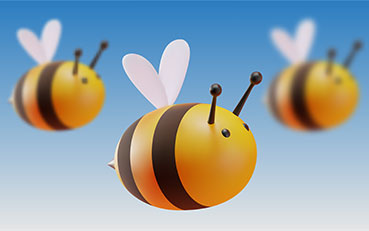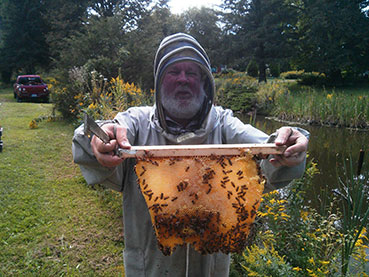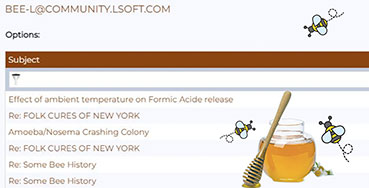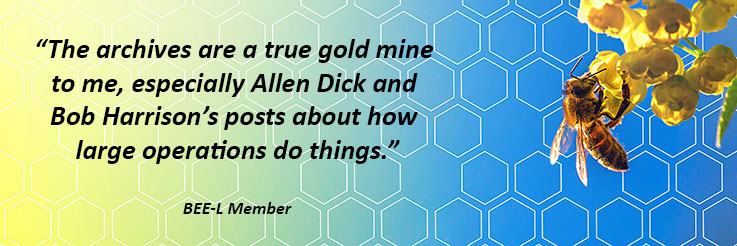Save the Bees, Save the World:
Behind the Scenes of the Longest Running Bee Discussion List
Can email groups help sustain our planet? Welcome to the extraordinary story of the BEE-L LISTSERV list. It's the oldest Internet bee list and has spawned many new bee forums and blogs over the years. It has about 1,000 members, who continue to try to work out how to best keep bees – sometimes to save the bees and sometimes to save the world from what we'd all be if we didn't keep bees.
The Beginnings

Bee discussion lists predate the Internet, having been hosted on Bitnet and dial-up platforms. In the 1990s, Professor Edward Southwick, a professor of biology at the State University of New York – whose discoveries led to the concept that individual bees' social group behavior makes a colony deal with cold temperatures very similarly to large vertebrates – started the BEE-L list at the University at Albany as a way for academics to exchange ideas about honeybees and other bees. The list archives go back to that era.
An Evolving Community

Aaron Morris, longtime BEE-L list owner and chief moderator from the '90s until his passing in 2021, who, along with Allen, shaped the list into what it is today.
BEE-L discussions have evolved from academic to more general bee-related topics, including conservation and management. LISTSERV has proved over many years to be an ideal platform, and eventually the list moved from the university server to being hosted on the L-Soft Community server.
Current members range widely in occupation, experience and interest – from university and government bee scientists to commercial beekeepers, bee magazine writers and editors, hobby beekeepers and interested members of the public. Active list members primarily span the Americas, the UK, Australia and Europe, with a member from China as well.
The list is now administered by Allen Dick, a retired commercial beekeeper currently living in Mexico and Jose Villa, a retired bee scientist living in Colorado.
"We get posts asking simple basic beginner questions and discussions about recent or older research. The tone is generally very civil and many of us know each other by reputation, from meetings and many years on the list. Some BEE-L members visit one another and sometimes make a point of meeting up at conventions."
Allen Dick
BEE-L List Owner
List Guidelines and Best Practices

The list guidelines are simple:
- Be polite, don't get personal and stay on topic
- Format your emails properly
- Don't quote more than a few lines of previous messages
Message content is the responsibility of the writer, and moderators don't edit posts. The restriction on quoting is to keep the archives searchable and non-redundant. Members are encouraged to dig back and research the history of a subject on the list and see the evolution of thought and practices and post new insights or questions.
"The archives are our library, stretching back to the '90s and contain the thoughts of people long gone and recent contributions, all easily browsed using the excellent LISTSERV search engine to search for words, parts of words, sets of words, phrases or authors."
Allen Dick
BEE-L List Owner

Bees: Essential Inhabitants of Planet Earth
- Although Apis mellifera (western/European honeybee) is the main bee species of public interest, there are many thousands of species of bees in the world that vary in size from tiny to the large and familiar bumblebee and Apis dorsata, the giant honeybee of South and Southeast Asia.
- Only a few species make enough honey to be kept under management for honey production, but bees are all valued for pollination, and some species are managed strictly to pollinate specific crops. The economic production of many familiar foods and spices is either partly or entirely dependent on insect pollination.
- Many bees are adapted to specific regions and are not widely distributed, but all are important in their niche. Some bees, like honeybees are social and live in colonies of tens, hundreds, thousands or tens of thousands of bees, and some are solitary.
|
"While managed bees are well studied, the effects of civilization on many of the native bees of the world are unknown. What is known, though, is that many are in decline due to loss of habitat and chemical use. Global trade has spread diseases and pests and challenged bee populations, both managed and native. Bees are resilient, but the combination of new challenges has made maintaining bees much more difficult than a century ago."
Allen Dick
BEE-L List Owner
LISTSERV is a registered trademark licensed to L-Soft international, Inc.
See Guidelines for Proper Usage of the LISTSERV Trademark for more details.
All other trademarks, both marked and unmarked, are the property of their respective owners.










